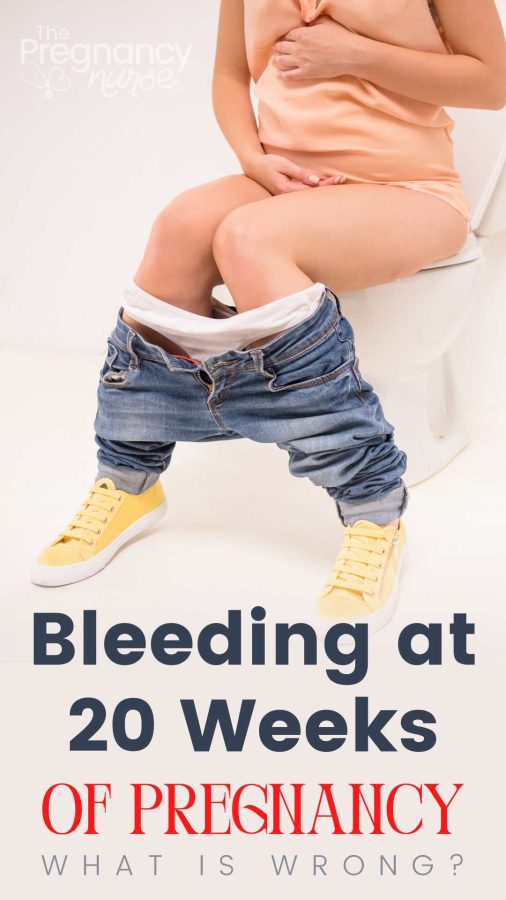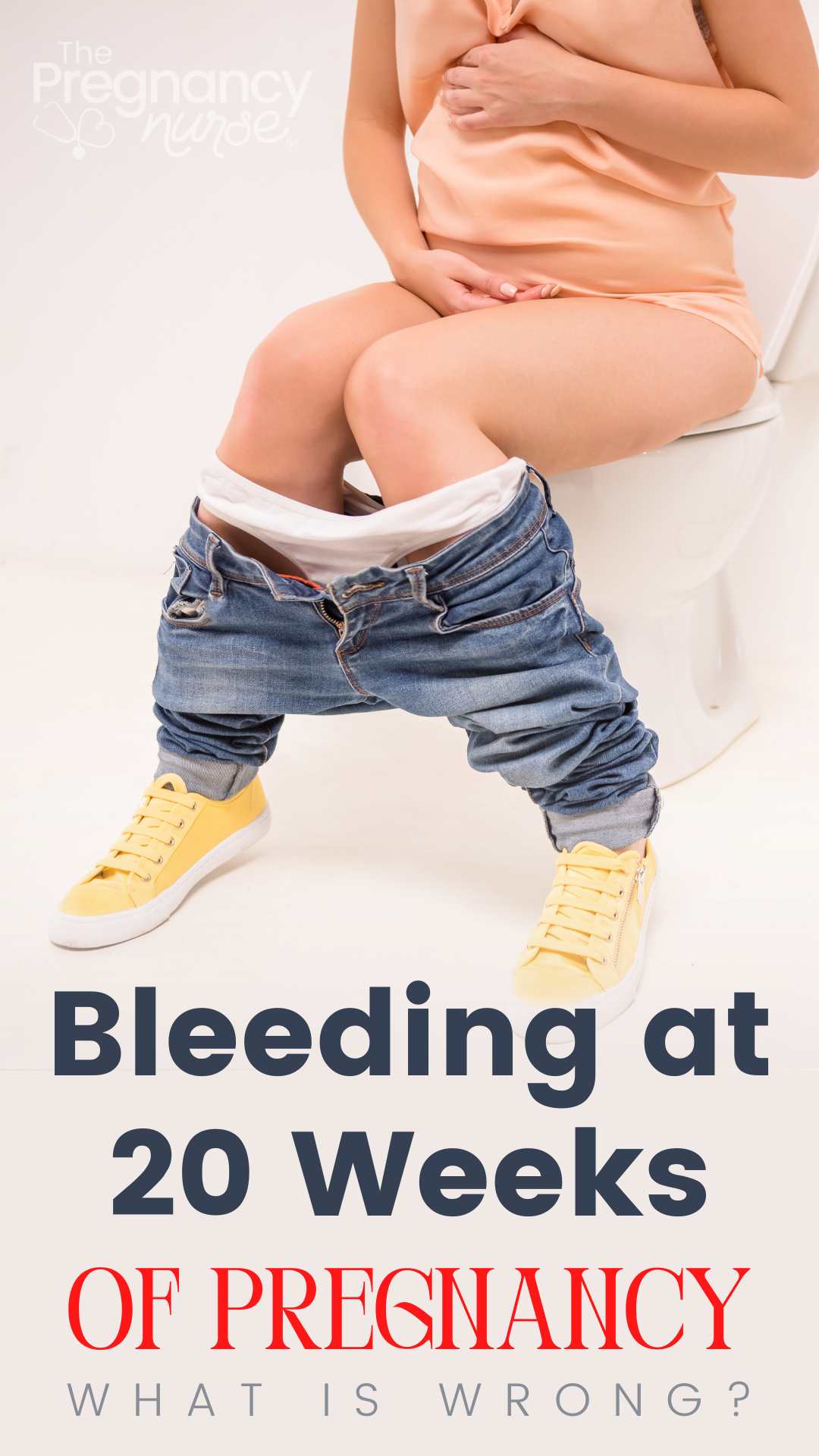Vaginal bleeding at any point during pregnancy can make you really worried. But, the worries change in each trimester. You’re well into your second trimester at 20 weeks, what is causing this bleeding during pregnancy and what should you do? Let’s talk about it.

But first, how do I know all of this? Hi — I’m Hilary — The Pregnancy Nurse 👩⚕️. I have been a nurse since 1997 and I have 20 years of OB nursing experience, I am also the curly head behind Pulling Curls and The Online Prenatal Class for Couples. 🩺 I have helped hundreds of second trimester bleeding moms as a nurse, so I am a good one to turn to in this situation.
Note: If you are having bleeding at 20 weeks of pregnancy you need to call your provider right away (even with just light bleeding). Even if it’s late at night, call the office and see if they have an emergency night line where you can talk with a provider (most do). The information in this article is purely informational and is not meant to replace your care from a provider who knows you, your circumstances and can help understand where the bleeding is coming from. This is very different than some spotting later in pregnancy.
Most often they will recommend that you see a doctor or a midwife right away (it can be really hard to diagnose things like this over the phone while also making sure that you and baby are safe).
I will also say that most often things are fine. We find the cause of the bleeding and we are able to fix it — but in the rare instances it’s something more you need to get medical assistance right away.
So, if you haven’t called your provider yet, I’ll just wait here while you do it. Go ahead — I’ll be here with lots of information for you once you make that first call. Just make sure you come back here, so we can talk about all the questions you should be asking yourself about the bleeding.
I’d love to join you during this pregnancy, I have lots of information for just what you are experiencing:
Questions to ask about bleeding during pregnancy
These are the questions providers normally ask patients about the bleeding to come to an idea of what the cause of bleeding is. They are good things to review in your head as you wait to hear back from your provider.
What does the bleeding look like?
If you find yourself bleeding during pregnancy you may have a lot of concerns. Should you see a doctor, is something wrong with your placenta? What is the cause of the vaginal bleeding?
💗 Is it red, brown or black in color?
💗 Are there any clots present?
💗 Are you passing any tissue along with the bleeding?
💗 How much bleeding is there? Is it light spotting or heavy bleeding?
💗 Does the bleeding come and go, or is it continuous?
💗 When did the bleeding start?
💗 Is there any discomfort associated with the bleeding (cramping, pain)?
The color of the blood tells us something about it. If it is bright red, it is likely current bleeding (and more disconcerting)
If it is darker brown that is old blood that is just now coming out, and cause less worry.
If you’re having clots or tissue coming out that is also more disconcerting.
If it is more watery than just bleeding, it is possible that you have had a rupture of your membranes, and you need to see your provider ASAP — even heading into labor and delivery if they aren’t returning your call quickly (be sure to give them your cell phone so you can answer even if you’re on your way to the hospital).
How much blood is it?
💗 Would you call it light spotting or heavy bleeding?
💗 Is there enough to fill up a pad? What percent of the pad is filled would you guess?
💗 Does the bleeding come and go, or is it continuous?
💗 When did the bleeding start?
Obviously, the more blood the more concerning. If you are filling the majority of a surface of a pad, you may want to just head into the hospital instead of waiting for a return call.
If you are filling a full pad you need to go to the hospital now. If the bleeding is a lot, you may want to consider calling 9-1-1, or your local emergency line. Blood loss can be life-threatening.
Any other symptoms?
💗 Are you having any abdominal pain, backache, dizziness or headaches?
💗 Have you had any nausea, vomiting or fever recently?
💗 Do you feel lightheaded or faint when the bleeding occurs?
💗 Does it hurt when you pee (could the bleeding be coming from your urethra and not your vagina).
💗 Do you have hemorrhoids or have you had a lot of painful bowel movements (it could be your rectum rather than your vagina — you can always blot with some toilet paper back there to see if that is the culprit).
The questions here are wondering if your uterus is starting to contract (making your cervix open) or is it something else? All of these answers just help us point more to the cause more quickly.
Are you feeling baby move?
At 20 weeks of pregnancy, the majority of pregnant people have felt some fetal movement (but not all — it often depends on where your placenta is located)
💗 Are there any changes in the movements of your fetus that coincide with the bleeding?
💗 Have you felt any reduced fetal movement after the bleeding started?
If you continue to feel baby moving that is a good sign, but still take the bleeding seriously and call your provider.
This all being said, at 20 weeks, often feeling fetal movement is not quite a pattern, so — unless the fetal movement has drastically changed from what you normally felt, it is not a sign of much.
We don’t recommend you do kick counts until your third trimester.
What is your obstetrical history?
💗 Have you had any vaginal bleeding during past pregnancies?
💗 Any issues with your placenta seen on your ultrasounds (like a placenta previa)?
💗 Are there any medical conditions, such as hypertension or diabetes, that need to be considered?
💗 Do you have any pre-existing conditions, such as anemia, that might affect the outcome of this pregnancy?
If you have a placenta previa that has been shown on an ultrasound, your provider has likely gone over what to do if you experience bleeding. You would want to get right to the hospital if that is you.
FYI a previa is where the placenta covers up the cervix.
If you are Rh negative you will want to discuss a RhoGAM shot with your provider when you see them.
What have you done today?
💗 Have you had penetrative sex?
💗 Have you had a vaginal exam by a provider?
💗 Are you doing more, physically, than you normally do?
💗 Have you done any recreational drugs?
Are you under a large amount of stress at this time?
Sex or an exam can cause some spotting, but should not be more than that
If you’re doing a lot more activity than usual, or experiencing high and unusual amounts of stress, that is something to tell your provider.
If you have done drugs you should freely admit that to your provider so they can best help your baby.
Questions You Might Have About Vaginal Bleeding:
How do I tell if it it is “bleeding” or “spotting”?
This is so confusing — and I understand that. To me, spotting is normally just on the top layer of the sanitary pad and should be less than the size of a quarter. If you are not currently wearing a pad, I would put one on just so you can see how much is coming out.
I would recommend that any type of bleeding at 20 weeks should get a phone call into your provider.

What could cause bleeding?
It’s really hard to say. The biggest concerns are:
- Your bleeding may be a sign that your cervix is starting to open — and it is too early for your baby to be born at 20 weeks.
- Your placenta is having some issues causing the bleeding.
But, vaginas have lots of extra blood flow during pregnancy, even if early pregnancy. That means that they can be the cause of the bleeding, which is not as much of a worry.
Also, above I mentioned that it could be from your urethra rather than your vagina. It could ALSO be from your rectum (especially if you have something like hemorrhoids or lots of constipation going on). You can always blot in the different areas with toilet paper to see which area is bleeding.
Is this different than first trimester bleeding?
Miscarriages happen before 20 weeks. If you were to have a loss of fetal life past 20 weeks it is considered an early stillbirth — and so it is classified differently.
That being said, most fetal losses happen before 12 weeks of pregnancy (so, in your first trimester). Also, you have minimal risk of an ectopic pregnancy or a blighted ovum if you have previously seen baby on your ultrasounds.
The second trimester of pregnancy tends to be a sweet spot where things go well as baby just grows and forms more vital parts.
Am I miscarrying?
TW: Fetal Loss & fetal death — This may not be a discussion that is good for you right now, you may want to skip to the next heading if you think that would be better for your metal health right now. No amount of information or distress will change what is going on with your body right now (and, in fact, could make it worse)
This is probably the big question in your mind, and in your provider’s mind as well. From my experience most people at 20 weeks with bleeding are not losing their baby. Although it could happen (as it could during any week of pregnancy). I do have a post on early pregnancy bleeding and if it means a miscarriage.
I looked at length to find out when most fetal losses happen and it is difficult to acertain.
Most fetal loss happens in the first trimester, but that is termed a “miscarriage”, and a loss past 20 weeks is considered a stillbirth. Because the two are termed differently, I can’t find any study that shows rates of fetal death throughout pregnancy. But, it should give you comfort knowing that most people at 20 weeks have something else going on that can be helped.
Is this different than late pregnancy bleeding?
It is most definitely normal to see some bleeding as you go into labor. As long as you’re past 36 or 37 weeks they would not stop you from having a spontaneous labor at that point. However, prior to that they would consider stopping your labor as baby is not quite ready to be born yet. Even early third trimester bleeding is dealt with similarly to bleeding at 20 weeks.
What will they do?
They will ask you all the questions we went over in here, plus more. They will take an assessment of your current vaginal discharge, and they may do a speculum exam to see if they see where the bleeding is coming from.
They will apply the fetal monitors to assess baby (although their ultrasound will likely not pick up baby continuously, they may need to use a doppler to find baby’s heart rate).
They will likely order an ultrasound to see if it sees any cause of the bleeding, as well as assessing for baby’s well-being.
They may put you on medications to stop any contractions, to prevent preterm labor, or put you on bed rest if they think the bleeding is due to contractions or your activity levels. It all just depends on what they see.
Have questions about the testing they do in the hospital — come join me in my Free Beginning Prenatal Class where we talk about 3rd trimester testing and birth plans!
Where do I go at the hospital?
I hate how confusing this is. If your provider hasn’t reviewed with you where to go at the hospital you can always just go to the emergency room. Be sure to tell them how far along you are, and what your due date is and they can direct you to the right place.
Vaginal bleeding during pregnancy can be REALLY disconcerting — and providers know that. We want to check for fetal well-being and for the cause as soon as possible, which is why you should call your provider ASAP if you see any bleeding. Bleeding during the second trimester is treated differently than that late in pregnancy or bleeding during the first trimester, so just be prepared as to what to expect from your providers.
Hopefully by now you’ve heard back from your provider or made a plan about what you’re going to do next. I’d love it if you’d join me in The Online Prenatal Class for Couples where we can help you feel more prepared from bump to bassinet.
And, if you’re not quite sure you’re ready for that whole thing, check out my free prenatal class. It’s your first step toward getting in the driver’s seat of your birth.
Don’t miss my super helpful post all about the signs of labor. Great info for pregnancy!







 When Will My Doctor Induce Labor?
When Will My Doctor Induce Labor?
